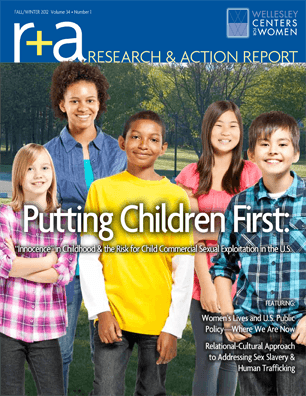Research & Action Report, Fall/Winter 2012
By Connie Gunderson, Ph.D.
Trafficking in human beings is the second most lucrative illegal activity worldwide. Human trafficking is an extreme example of social injustice perpetuated by dominant-subordinate attitudes that condone violence, resulting in significant suffering for individuals and harm to societies (Gunderson, 2012). It is a serious human rights violation and a low-risk, high-profit crime that is well hidden, underreported, under-prosecuted, and where trafficked persons experience extreme forms of physical and psychological violence and death.
Research & Action Report, Fall/Winter 2012
Interview by Susan Lowry Rardin
This is a fateful time for the United States. Two distinct visions for the country were pitted against each other in the recent elections. Clearly, women’s rights are still in question; civil rights are seen by some as irrelevant; and the federal budget deficit looms without a consensus as to its importance or how to fix it.
Public policy decisions, which often seem about war and the budget, are, in fact, always about women as well. Though we must focus on “women’s issues,” we must not lose sight of the importance for women of economic and military issues, Supreme Court and other judicial court appointments, and even environmental policies. As the Wellesley Centers for Women motto goes: “A world that is good for women is good for everyone.” - Jean Hardisty, Ph.D.
Research & Action Report, Fall/Winter 2012
By Kate Price, M.A.
As a society, we often seem to care more about protecting our cultural ideal of childhood innocence than about meeting the actual needs of real-life children—especially commercially sexually exploited children. To fit the ideal of purity, children require high levels of social capital—preferably, they’re white, middle or upper class, and heterosexual. They have limited or no sexual experience, enjoy secure health care, housing, and education, and they live within a supportive nuclear family. In my experience, children living without access to such resources are too often labeled “bad kids” and blamed for “choosing” to exist outside of this ideal.
Research & Action Report, Fall/Winter 2012
Wellesley Centers for Women research and action initiatives are funded primarily by federal, state, and corporate grants and contracts. Several new and continuing projects received funding over the past six months.

In this issue:
 | Wellesley Centers for Women 781.283.2500 |
Copyright © 2026 Wellesley Centers for Women, Wellesley College | Privacy Policy
